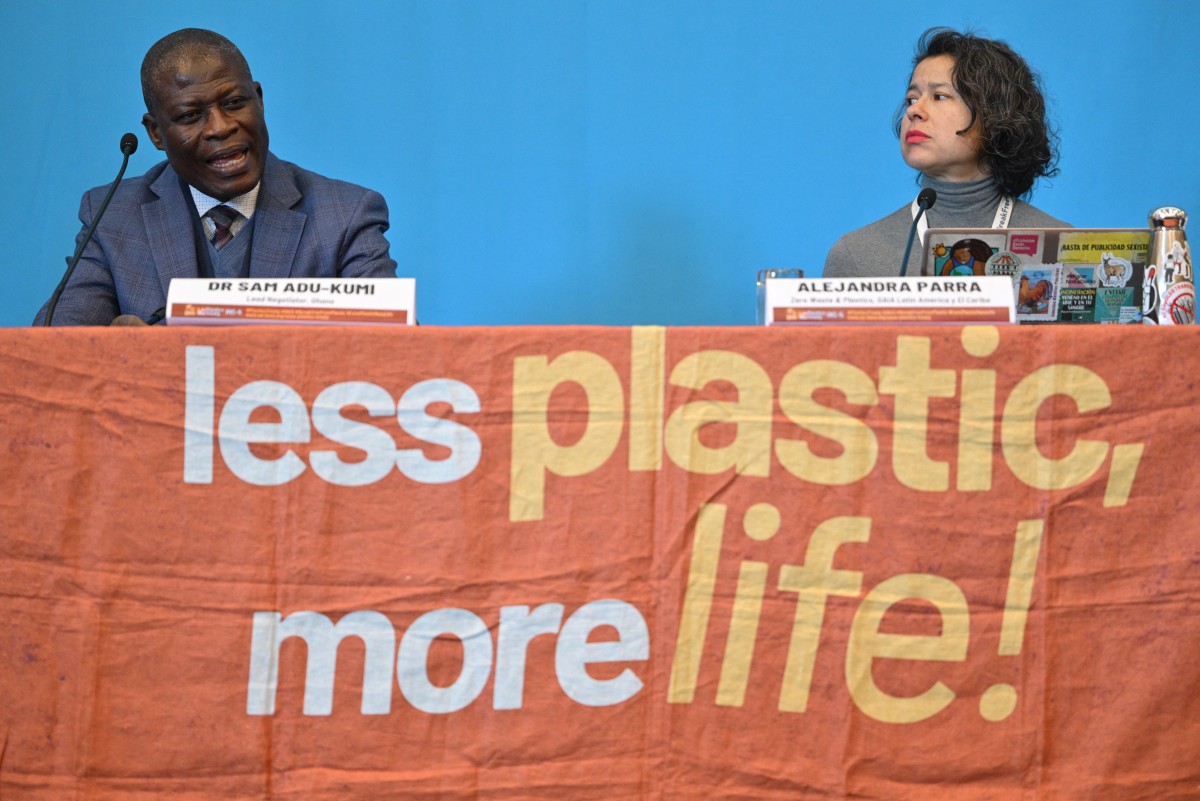barya88-barya88 casino-Barya88 Official
POSITION:barya88-barya88 casino-Barya88 Official > Barya88 Official >
Updated:2024-12-03 04:27 Views:106

Ghana’s lead negotiator Sam Adu-Kumi speaks as Alejandra Parra, zero waste and plastics advisor for GAIA Latin America and the Caribbean, listens at a press conference during the fifth meeting of the Intergovernmental Negotiating Committee to develop an international legally binding instrument on plastic pollution (INC-5) in Busan on December 1, 2024. Agence France-Presse
BUSAN — Divisions between countries have stalled negotiations on the world’s first treaty to tackle plastic pollution, after a terse week of talks in South Korea’s Busan.
Here are some of the sticking points that led to a decision early Monday to resume discussions at a later date after negotiators were unable to strike a deal:
Article continues after this advertisement Production cutsThe 2022 resolution that kicked off two years of negotiations called for a treaty that would “promote sustainable production and consumption of plastics”.
FEATURED STORIES GLOBALNATION Biden pardons son Hunter in final weeks of presidency GLOBALNATION 20,000 more foreign Pogo workers to leave PH as deadline nears - BI GLOBALNATION Norway suspends deep-sea mining projects – gov't alliesBut what that means has proved a key point of disagreement.
READ: Treaty talks in South Korea tackles plastic pollution crisis
Article continues after this advertisementDozens of nations want the deal to mandate a reduction of new plastic production, and there have been calls to phase out “unnecessary” items such as some single-use plastics.
Article continues after this advertisement“Mopping the floor when the tap is open is useless,” said Anthony Agotha, the EU’s special envoy for climate and environment.
Article continues after this advertisementBut others, led by some oil-producing states like Russia, Iran and Saudi Arabia, have pushed back against any binding reduction call.
“The objective of this treaty is to end plastic pollution, not plastic itself. Plastic has brought immense benefit to societies worldwide,” Kuwait’s delegate said Sunday.
Article continues after this advertisement ‘Chemicals of concern’An alliance led by Rwanda and Norway pushing for specific measures on production, the High Ambition Coalition (HAC), is also seeking controls on so-called chemicals of concern.
These are components of plastic that are known or feared to be harmful to human health.
READ: No accord on plastic pollution deal, more time needed – chair
Any agreement “must contain a clear, legally binding obligation to phase out the most harmful plastic products and chemicals of concern in plastics”, Mexican delegate Camila Zepeda said in the final plenary session, in a statement backed by nearly 100 countries.
Fiji’s representative had earlier warned there would be “no treaty without a provision on chemicals of concern”, calling it “a non-negotiable”.
But some countries have rejected any push to phase out or restrict the chemicals, pointing to existing international agreements and national regulations on toxins.
The Center for International Environmental Law (CIEL) said its analysis of a UN list of participants at Busan showed over 200 lobbyists from the fossil fuel and chemical industries were registered for the talks.
FinanceImplementing any treaty will cost money that developing countries say they simply do not have.
An article on financing in the latest draft agreement released on Sunday was full of conflicting possible options, reflecting deep disagreement on who will pay what, and how.
One focus of the talks has been creating a dedicated multilateral fund for the purpose — after the hard-fought battle at COP29 climate talks to extract more finance from developed countries.
But the details are proving complicated.
“As developing countries have repeatedly called for in the past few days, the instrument should respect national differences” and “reflect equity and inclusiveness,” China’s delegate said late Sunday.
Globally binding?Will the treaty create overarching global rules that bind all nations to the same standards, or allow individual countries to set their own targets and goals?
This has been another sticking point, with the European Union initially warning that “a treaty in which each party would do only what they consider is necessary is not something we are ready to support”.
On the other side are nations who argue that differing levels of capacity and economic growth make common standards unreasonable.
“There shall not be any compliance regime,” reads language proposed during negotiations by Iran.
Subscribe to our daily newsletter
Insteadepoch game, it has urged an “assessment committee” that would monitor progress but “in no way” examine compliance or implementation.
READ NEXT UNRWA stops aid delivery via key Gaza-Israel crossing Norway suspends deep-sea mining projects – gov’t allies EDITORS' PICK West PH Sea: PCG deploys vessels after alleged China helicopter harassment 20,000 more foreign Pogo workers to leave PH as deadline nears - BI Biden pardons son Hunter in final weeks of presidency VP vows to face House panel anew Dolly de Leon wins Best Supporting Actress at Critics Choice AAPI event Russian attack sub spotted in West PH Sea MOST READ Garcia on Erice’s inhibit call to Comelec commissioners: 'Illogical' First impeachment complaint vs VP Sara filed at House Russian attack sub spotted in West PH Sea Solons understand Marcos’ advice vs VP Duterte's impeachment Follow @FMangosingINQ on Twitter --> View comments